- Home
- Diana Killian
Docketful of Poesy Page 14
Docketful of Poesy Read online
Page 14
I barely heard him. I was staring at my scone. It sounds ridiculous, but it was the first time I remembered him taking a bite from food on my plate. It was such a simple and ordinary moment of domesticity that I actually felt…moved.
Peter had already moved away in search of his wallet. He was getting ready to deliver two rosewood Rococo armchairs and some other items to Angela Hornsby’s estate and would be out all day. Which was probably a good thing with the film crew back on the premises. It would save wear and tear on everyone’s nerves if Peter were safely out of the way for most of the day.
“Is it all right if I use your computer this afternoon?” I called.
“What’s mine is yours.” I couldn’t help noticing how unconsciously sexy he was in those jeans and the blue cambric workshirt that emphasized the worldly blue of his eyes. “I’ll see you later tonight, will I?” He stooped and kissed me.
And then kissed me again.
“Oh, yes,” I said.
*****
The sunshiny promise of the morning held, and filming went smoothly that day—at least from what I understood. To be honest, I spent a good portion of the morning closed up in Rogue’s Gallery trying to find out what I could about the Kismet Production Company.
The problem was there were several Kismet film companies. There was a Kismet Media Group, which was a talent and brand management company; Kismet Entertainment Group, which was an indie film production company that seemed to handle everything from comic books to video games; and there was Kismet Films, based in New York, which was a feature film and commercial production company.
Kismet Films initially looked promising, but I had trouble believing that the company that had produced several critically acclaimed documentaries, shorts, and corporate image pieces was one and the same as the haphazard assembly I was part of.
There was a Kismet dance production company, a Kismet cleaning service, and several Kismet import companies.
None of them looked to be my Kismet Production Company, but I couldn’t completely rule them all out at first glance. I was going to have to dig a little deeper and perhaps make a few phone calls while being careful not to give my suspicions away in case I truly was unduly paranoid.
I Googled and Yahoo’d “Miles Friedman”, and there was no question that he was the genuine article. The genuine article being a second-string director with many more romantic conquests than film credits. But he did have film credits—and some of them were quite good.
I had less luck tracking Roberta down. Twelve pages into a search for “Roberta Lom,” and nothing relevant was coming up. I tried The Internet Movie Database and there were one or two mentions of an actress named Roberta Lom. No pictures. It was possible that Roberta had started out as an actress. She was known to Miles and Mona, so she couldn’t entirely be a fake—and maybe movie producers, unlike movie directors, didn’t get a lot of press.
I decided to try to find out what I could from Mona and some of the other cast members and then try searching again.
And I could always ask Brian for some help. Not that he ordinarily approved of my sleuthing, but being in law enforcement he probably endorsed paranoia on general principles.
When I had done about all the online detecting I could accomplish in one sitting—and eaten all the chocolate chip scones—I went downstairs to observe Cordelia’s theatrical debut.
Her first scene basically consisted of crawling around the outside of Rogue’s Gallery, peering in windows, and then getting knocked out by Norton using what looked like a lethal lead (but was actually rubber) pipe. No dialogue was required, unless Cordelia’s quite realistic yowl of pain counted.
Of course I could have told her from having been knocked out myself on one memorable occasion that there’s no time for yelling when you’ve been struck unconscious, but it did make for a nice dramatic moment.
Undeterred by the camera pointed her way, and the number of people watching her, Cordelia, in character as Jacinda, did a convincing job of slinking along the wall of the building, scowling ferociously into the unlit windows. I suppose I found her performance especially amusing since she was pretending to be her cousin Allegra. Al and I had initially got off on the wrong foot, and diplomatic relations hadn’t improved over the years.
Collapsing dramatically into the flowerbed, Cordelia, cushioned by daffodils and crocuses, won a round of applause from the crew. Miles pronounced himself happy with this take, and because of the cast members taking tea with Lady Venetia Brougham later that afternoon, we were all excused.
I found myself being driven back to Innisdale by Cordelia in a sporty little black Jag convertible, which she informed me had been a present from her parents upon her acceptance into drama school.
“My reward for keeping out of their hair,” she told me with that coolly adult cynicism that always took me aback.
“But you’re still staying with your great-aunt on weekends?”
“Off and on,” she said cryptically, punching the accelerator so that we might zip around yet another long, dawdling tour bus on the wide country lane.
I felt my hands bunching into fists, and deliberately smoothed them out. Cordelia, hair whipping around her head, threw me a quick grin as though reading my mind.
She was actually not a bad driver, though she was definitely a bit of a speed demon. We flew down the road, the countryside passing in a green-gold flash of grass and sunlight and daffodils.
“How do you like drama school?”
“It’s all right.” She shot me a quick sidewise glance. “They all take themselves far too seriously.” She combed strands of hair out of her mouth. “I suppose it’s all about the slow and painful decay of the middle class, isn’t it?
“Isn’t what?” I asked carefully over the howl of wind in my ears.
“Oh, you know. Other people imposing their values. What it’s really all about is art and passion and being true to yourself. Or it should be.”
Ah. I called upon the experience of years spent teaching adolescent girls. “Are you seeing someone?” I asked.
She blushed. And she was not a girl given to blushing. Flushing a painful and awkward red when she tripped or dropped something or said something she didn’t mean to say…yes. Not this delicate flush of color in her thin face. “His name is Douglas,” she told me, and I could see the struggle it was for her not to smile when she spoke his name. “I call him Dougie.”
I smiled, too. “And he’s planning to be an actor as well?”
“Oh no,” she said blithely. “He’s done with all that. He’s an instructor at the school. And a playwright. He’s writing a play for me. It’s called Wild Cherries.”
I swallowed hard and managed not to say the first thing that occurred to me. “Is he?” I got out weakly. “Have your parents or…your aunt met him yet?”
“Auntie Vee?” She burst out laughing at the idea, and I chuckled feebly with her, wondering what the hell I should do about this—if anything. Cordelia was nearly eighteen; she was my friend, not my student or daughter or little sister. And maybe cherry-flavored Dougie was a perfectly decent, not very old, unmarried instructor.
Right. And maybe Peter and Brian would one day be the best of pals—and Catriona would act as my maid of honor when I married her former lover.
We were nearing the environs of Innisdale, and Cordelia slowed from suicidal to merely reckless speed. As we wound through the narrow village streets, she continued to chatter about what Douglas thought about this and that—he was certainly an opinionated man—but while I ended our drive knowing how Douglas felt on such vital topics as Oprah’s book club, architecture and urbanism, and sexual politics, I still had no idea of how old he was or whether he was married.
I knew better than to ask outright. In fact, as I had surmised, the less curiosity I revealed about Douglas, the more I heard. None of it reassuring.
Cordelia followed me into the inn and upstairs, sitting on my bed while I did my makeup and then changed into a s
kirt and sweater.
“Is your aunt really hoping someone is going to make a movie out of one of her books?” I asked, checking copper earrings against my Ralph Lauren cable knit cardigan.
“Partly. Partly I think it’s just an excuse to see you,” Cordelia said, rising to try on a pair of my earrings.
“Why would she want to see me?” I questioned suspiciously. Not that I didn’t believe her. I’d been caught up in several of Lady Vee’s schemes, and I suspected she viewed me in the light of a never-failing patsy. In fact, my friendship with Cordelia began when her great-aunt coerced me into acting as a sort of chaperone-companion the previous summer.
“No idea,” Cordelia said cheerfully. “Could I borrow these?”
“Not until you return the amethyst ones you borrowed.”
“Oh, I’d forgotten about those!”
“I hadn’t.”
She giggled, untroubled, and watching her face in the mirror I felt a twinge of something uncomfortably maternal. I knew I was eventually going to have to find out more about this new man in her life—which probably wouldn’t be a problem since I seemed to spend a lot of my time snooping.
We went downstairs and found most of the cast getting ready to leave for the tea party, the usual debate ranging about who would drive with whom. Mona, delighted to have finally located her missing flask on the mantelpiece in the anteroom next to the lobby, hitched a ride with us in Cordelia’s black Jaguar.
“I’ve always wanted to have a real English high tea,” she said, not blinking an eye as Cordelia roared away from the inn. “Do you suppose there will be crumpets and cucumber sandwiches?”
I don’t think I’ve ever had a decent cucumber sandwich in my life, but I murmured noncommittally. Being vegetarian, Mona probably approved of cucumber sandwiches in all their soggy glory.
“High tea is dinner,” Cordelia informed her, throwing a windblown look over her shoulder. “We’re having afternoon tea. Low tea.”
Mona raised her eyebrows, exchanging a look with me, and I explained, “You and I, well, most Americans, think of high tea as a fancy, full tea, but it’s actually the evening meal. Usually with meat. We’re going to be treated to an afternoon or a cream tea, I’m guessing. Savories and sweets, scones—crumpets, probably.” I didn’t tell her that Lady Vee would be serving crumpets as a concession to the Americans.
“Desserts,” Cordelia said. “Auntie has a new pastry chef.”
Mona licked her lips. “Lovely.”
The subject of tea and crumpets exhausted, I asked casually, “Mona, how long have you known Roberta?”
She shrugged a bony shoulder. “We both worked on a TV special a few years back. I hadn’t seen her for ages. Not until I got the call for this project.”
“You’ve never done a film for Kismet Productions before?”
She gave me an odd look. “I don’t believe they’ve done many films. They’re fairly new from what I picked up.”
“But you knew Miles?”
She laughed. “Oh, yes. Miles and I go way back.”
“When I first talked to Walter Christie he said some things about Roberta and Miles not really being in control of the production.”
“Poor little Walter,” she said regretfully. “Well, Miles and Roberta have to answer to their corporate overlords like all the rest of us minions.”
I’d have liked to ask her more questions, but she leaned back in her seat, lifting her face to the pallid sun and enjoying the wind through her hair.
*****
“Grace, my deah,” drawled Lady Venetia Brougham in welcome, vaguely waving her guests to the invitingly placed chairs and settees littering the elegant drawing room. “You decided to return after all. I admit I feared we would never see you again. Dear Petah must be utterly…flummoxed.”
“Oh, but I always enjoy our little visits,” I retorted. “Peter knows that.”
She snickered, eyeing me with her lizard-dark eyes. In an unexpected concession to her age—which was eighty-something—Lady Vee had finally given up the raven-haired Cleopatra bob. Her pale silver hair had been cut pixie-style. And, in fact, being tiny, wizened, and more than a little malicious, the cut suited her rather well.
“And how did you find your family and friends?” she inquired politely, meanwhile directing servants and guests alike with her long ivory cigarette holder. Uniformed maids placed heavily laden silver trays on several low tables in front of my fellow guests.
I resisted the urge to say something uncharacteristically smart-aleck, like I’d found them without any problem since they weren’t trying to lose me. “I’m happy to say everyone was quite well.”
“We did wonder when you kept coming up with exc—reasons for postponing your return. I think Petah had given you up as a lost cause, my deah. I know Allegra had the impression you were not expected to return anytime soon.”
I happened to notice Cordelia open her mouth and then close it. She gave me a funny, guilty look. What did that mean? Oh, I knew what Lady Vee was implying, but that didn’t worry me unduly. She liked needling me with the idea that her niece, one of Peter’s former lady friends, was still—to use one of her own sporting metaphors—in the running.
“Well, I’m back now,” I said brightly.
“And you’ve brought such enthrahlling friends and colleagues with you this time.” She made it sound like I’d arrived with elephants and trapeze artists in tow, but before I could respond—had I a suitable response—Lady Vee turned on her party manners and began to wow the colonials with her lemon curd and Earl Grey.
Pammy’s plate was piled BBQ-fashion with pastries and sweets. I could see Mona observing our hostess quietly and taking mental notes, but she was too shrewd to make the fatal mistake of mentioning that she was playing a Lady Vee clone in Dangerous to Know. Although one never knew: Lady Vee might actually have got a perverse kick out of her cinematic reincarnation.
Miles and Tracy sat on one of the velvet love seats next to the ancient harpsichord, whispering and eating. At one point Tracy was actually feeding Miles cake, so I really couldn’t blame Norton for the glowering looks he was sending their way, although I didn’t think he was glowering for the same reason Roberta was.
Everyone else seemed suitably impressed and enthusiastic, although Todd was overplaying the forelock-tugging a tad.
But then tea at Lady Venetia’s—any meal, really—was always a sumptuous affair, and that afternoon was no different. The quantities of jam-filled scones, blue-frosted fairy cakes, chocolate sponge cake, and blackberry tarts were provided in keeping with North American notions of portions. The tea itself was exquisite, delicate and flavorful, and I could see the old beldame watching with glinting amusement as her guests puzzled over whether the milk went into the cups before the tea, whether they were supposed to balance fragile cups on dainty saucers or hold them separately, whether the paper-thin slice of lemon went in the cup or not, and what to do with those gleaming sterling teaspoons.
Something about Lady Vee and her centuries-old surroundings made even the most confident person suddenly want to reach for the latest edition of Emily Post.
When we had finally finished gorging ourselves on sweets, and Lady Vee had grown bored with torturing the savages with small talk, we were invited to view the justly famous rose gardens.
It was growing late in the afternoon as we filed out to explore the series of garden rooms boxed by green hedges and bordered by huge, ancient rosebushes. The scent of herbs and musky roses perfumed the neatly trimmed walkways. As expected in a classic English garden, there were numerous whimsical structures and topiaries pruned into imaginative shapes, as well as several lovely marble statues positioned amidst the harmoniously laid-out flowerbeds. Everyone oohed and ahhed appropriately.
“Has Cordelia mentioned to you that she’s been hired to act in this film?” I asked Lady Vee as we happened to find ourselves standing by the goldfish pond while everyone else wandered along the paths and out of immediate earshot.
“The deah child may have said something about it,” Lady Vee replied vaguely. She had brought a basket and a pair of secateurs with her, and was ruthlessly clipping withered blooms. I suspected at first it was just part of her Lady of the Manor act, but she was getting too much pleasure out of the snipping.
“And you’re all right with that?”
The gimlet eyes met mine. “Shouldn’t I be, my dear?”
I had no desire to sabotage the film production of my own work, but honesty compelled me to say, “I don’t know. There’s something I can’t quite put my finger on. Don’t you think they’re all a little…strange?”
She said sweetly, “They’re Americans, my deah.”
“I realize that. But besides being born on the wrong side of the Atlantic —”
A shrill scream split the rose-scented tranquility. Lady Vee went rigid, her eyes meeting mine.
Turning, I ran down the path following the hysterical babble of voices—there were more screams and then they cut off sharply.
I rounded the corner of a wall of yew trees. Several people formed a horseshoe around a body sprawled on the ground. I stared at the horrified faces: Tracy clung to Miles—and so did Roberta. Norton knelt on the ground beside the body, staring down at the twisted face.
“She’s dead,” he said in a sleepwalker’s voice.
“Jesus Christ almighty,” Miles said.
Someone gave a sob, and I looked at Cordelia. She was in Todd’s arms. Her face was white and streaked with tears; but seeing her, I relaxed a fraction: it had been her scream that sent me racing through the garden.
Cordelia quavered, “S-she took a drink and then she…started gasping for breath…and then she fell down and began to…went into…c-convulsions.”
“And then she died,” Roberta said dazedly. “Just like that. It was so fast. She was… dead.”
In silence we all stared down at Mona. Her hair lay in long strands across her face, not quite concealing her staring eyes. A few inches from her outstretched fingers lay her small silver flask.
Chapter Fifteen

 High Rhymes and Misdemeanors
High Rhymes and Misdemeanors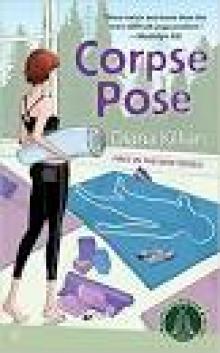 Corpse Pose
Corpse Pose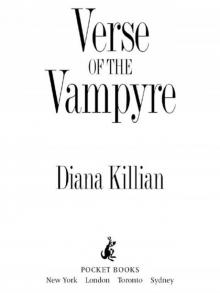 Verse of the Vampyre
Verse of the Vampyre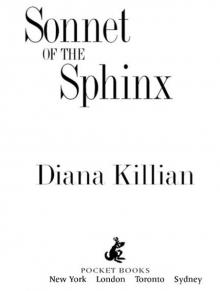 Sonnet of the Sphinx
Sonnet of the Sphinx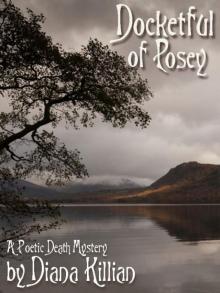 Docketful of Poesy
Docketful of Poesy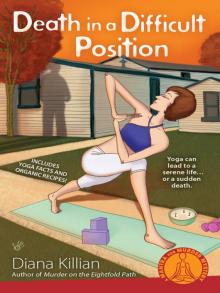 Death in a Difficult Position
Death in a Difficult Position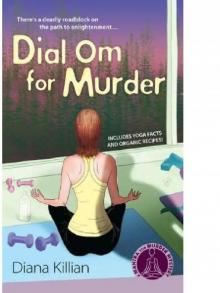 Dial Om for Murder
Dial Om for Murder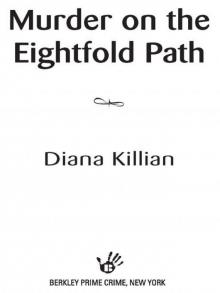 Murder on the Eightfold Path
Murder on the Eightfold Path